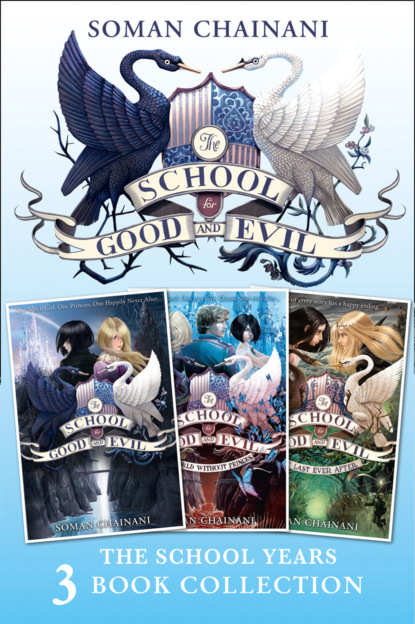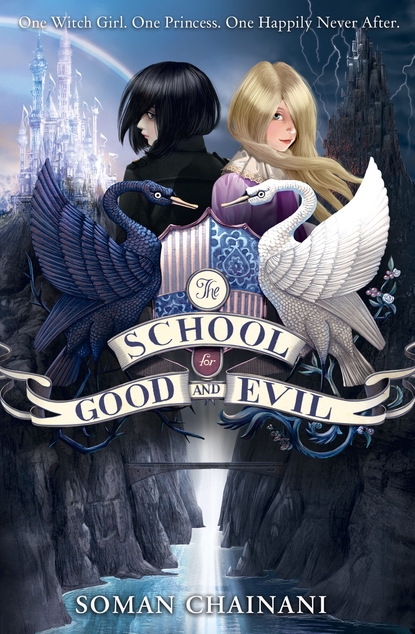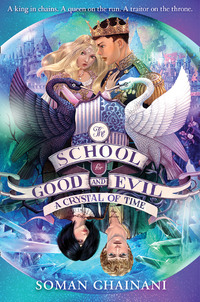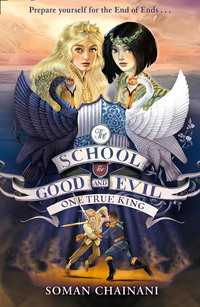
Полная версия
The School for Good and Evil: The Complete 6-book Collection
“Lizards are better fresh, dear. What can we make with those?”
“I forgot all that stuff—”
“They’ll go bad—”
“Stop!”
Her mother stiffened.
“Please,” Agatha begged. “I don’t want to talk about school.”
Gently Callis took the basket from her. “When you came home, I’d never been so happy.” She looked into her daughter’s eyes. “But part of me worries what you gave up.”
Agatha stared down at her black clump shoes as her mother towed the baskets into the kitchen. “You know how I feel about waste,” Callis sighed. “Let’s hope our bowels can handle a lizard stew.”
As Agatha chopped onions by torchlight, she listened to her mother hum off-key, like she did every night. Once upon a time, she had loved their graveyard haven, their lonely routines.
She put down the knife. “Mother, how do you know if you’ve found Ever After?”
“Hmmm?” said Callis, bony hands scraping a few roaches into the cauldron.
“The people in a fairy tale, I mean.”
“It should say so, dear.” Her mother nodded at an open storybook peeking from under Agatha’s bed.
Agatha looked down at its last page, a blond prince and raven-haired princess kissing at their wedding, framed by an enchanted castle …
THE END.
“But what if two people can’t see their storybook?” She gazed at the princess in her prince’s arms. “How do they know if they’re happy?”
“If they have to ask, they probably aren’t,” said her mother, jabbing a roach that wouldn’t drown.
Agatha’s eyes stayed on the prince a moment longer. She snapped the storybook shut and tossed it in the fire under the cauldron. “About time we got rid of these like everyone else.”
She resumed chopping in the corner, faster than before.
“Are you all right, dear?” Callis said, hearing sniffles.
Agatha dabbed at her eyes. “Onions.”
The rain had gone, but a harsh autumn wind raked across the cemetery, lit by two torches over the gates that clung to skipping flames. As she approached the grave, her calves locked and her heart banged in her ears, begging her to stay away. Sweat seeped down her back as she kneeled in the weeds and mud, her eyes closed. She had never looked. Never.
With a deep breath, Sophie opened her eyes. She could barely make out an eroded butterfly in the headstone above the words.

Two smaller gravestones, both unmarked, flanked her mother’s like wings. Fingers covered by white mittens, she picked moss out of the cracks in one, overgrown from the years of neglect. As she tore away the mold, her soiled mittens found deeper grooves in the rock, smooth and deliberate. There was something carved in the slab. She peered closer—
“Sophie?”
She turned to see Agatha approach in a tattered black coat, balancing a drippy candle on a saucer.
“My mother saw you from the window.”
Agatha crouched next to her and laid the flame in front of the graves. Sophie didn’t say anything for a long while.
“He thought it was her fault,” she said at last, gazing at the two unmarked headstones. “Two boys, both born dead. How else could he explain it?” She watched a blue butterfly flutter out of the darkness and nestle into the carving on her mother’s decayed gravestone.
“All the doctors said she couldn’t have more children. Even your mother.” Sophie paused and smiled faintly at the blue butterfly. “One day it happened. She was so sick no one thought it could last, but her belly still grew. The Miracle Child, the Elders called it. Father said he’d name him Filip.”
Sophie turned to Agatha. “Only you can’t call a girl Filip.”
Sophie paused, cheekbones hardening. “She loved me, no matter how weak I had left her. No matter how many times she watched him walk to her friend’s house and disappear inside.” Sophie fought the tears as long as she could. “Her friend, Agatha. Her best friend. How could he?” She cried bitterly into her dirty mittens.
Agatha looked down and didn’t say a word.
“I watched her die, Aggie. Broken and betrayed.” Sophie turned from the grave, red faced. “Now he’ll have everything he wanted.”
“You can’t stop him,” Agatha said, touching her.
Sophie recoiled. “And let him get away with it?”
“What choice do you have?”
“You think that wedding will happen?” Sophie spat. “Watch.”
“Sophie …”
“He should be the one dead!” Sophie flushed with blood. “Him and his little princes! Then I’d be happy in this prison!”
Her face was so horrible that Agatha froze. For the first time since they returned, she glimpsed the deadly witch inside her friend, yearning to unleash.
Sophie saw the fear in Agatha’s eyes. “I’m s-s-s-sorry—” she stammered, turning away. “I—I don’t know what happened—” Her face melted to shame. The witch was gone.
“I miss her, Aggie,” Sophie whispered, trembling. “I know we have our happy ending. But I still miss my mother.”
Agatha hesitated, then touched her friend’s shoulder. Sophie gave in to her, and Agatha held her as she sobbed. “I wish I could see her again,” Sophie wept. “I’d do anything. Anything.”
The crooked tower clock tolled ten times down the hill, but loud, doleful creaks thickened between each one. In each other’s arms, the two girls watched the hunched silhouette of old Mr. Deauville as he wheeled a cart past the clock with the last of his closed-down shop. Every few paces he stopped, laboring under the weight of his forgotten storybooks, until his shadow disappeared around the corner and the creaks faded away.
“I just don’t want to end like her, alone and … forgotten,” Sophie breathed.
She turned to Agatha, trying to smile. “But my mother didn’t have a friend like you, did she? You gave up a prince, just for us to be together. To think I could make someone happy like that …” Her eyes misted. “I don’t deserve you, Agatha. I really don’t. After all I’ve done.”
Agatha was still quiet.
“Someone Good would let this marriage happen, wouldn’t they?” Sophie pressed her softly. “Someone as Good as you.”
“It’s late,” Agatha said, standing up. She held out her hand.
Sophie took it limply. “And I still have to find a dress for the wedding.”
Agatha managed a smile. “See? Good after all.”
“Least I can do is look better than the bride,” Sophie said, swishing ahead.
Agatha snorted and grabbed the torch off the gate. “Wait. I’ll walk you home.”
“How lovely,” Sophie said, not stopping. “I can smell more of that onion soup you had for dinner.”
“Lizard and onion soup, actually.”
“I really don’t know how we’re friends.”
Through the groaning gate, the two slipped side by side, torches lighting up their long shadows across overgrown weeds. As they waded down the emerald hill and out of sight, a gust flew back through the cemetery, igniting a flame on a candle dripping onto its mud-stained saucer. The flame grew over a blue butterfly settled curiously on a grave, then stoked brighter, long enough to illuminate the carvings on the two unmarked graves beside it. A swan on each. One white.
The other black.
With a roar, the wind lashed between them and blew the candle out.

Blood. It smelled blood.
Eat.
Smashing through trees, the Beast hunted their scent, grunting and slobbering on all fours. Claws and feet pounded the dirt, faster, faster, shredding vines and branches, bounding over rocks, until at last it could hear their breaths and see the trail of red. One of them was hurt.
Eat.
Through a long, dark, hollow trunk it slunk, licking up the blood, smelling their terror. The Beast took its time, for they had nowhere to go, and soon it heard their whimpers. Bit by bit they came into view, silhouetted in moonlight, trapped between the end of the log and a thick patch of briars. The older boy, wounded and pale, clutched the younger to his chest.
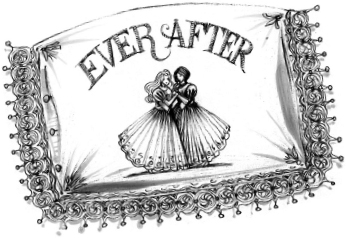
The Beast swept them both up and held the boys as they cried. Snuggled in briars, the Beast rocked them gently until the boys stopped weeping and knew the Beast was Good. Soon the boys breathed heavier against the Beast’s black breast, nestling deeper into its arms, hugging them tighter … harder … bonier … until the boys gasped awake …
And saw Sophie’s bloody smile.
Sophie flung up from bed and knocked into her bedside candle, splattering lavender wax all over the wall. She whirled to the mirror and saw herself bald, toothless, pockmarked with warts—
“Help—” she choked, closing her eyes—
She opened them and the witch was no longer there. Her beautiful face stared back at her.
Panicked, Sophie checked her shivering white skin for warts, wiping away the cold film of sweat.
I’m Good, she calmed herself when she found none.
But her hands wouldn’t stop shaking, her mind racing, unable to shake that Beast, the Beast she’d killed in a world far away, the Beast that still haunted her dreams. She thought of her rage in the graveyard … Agatha’s petrified face …
You’ll never be Good, the School Master had warned.
Sophie’s mouth went dry. She’d smile at the wedding. She’d work at Bartleby’s. She’d eat the widow’s meat and buy toys for her sons. She’d be happy here. Just like Agatha.
Anything to not be a witch again.
“I’m Good,” she repeated into silence.
The School Master had to be wrong. She’d saved Agatha’s life, and Agatha had saved hers.
They were home together. The riddle solved. The School Master dead.
The storybook closed.
Definitely Good, Sophie assured herself, snuggling back into her pillow.
But she could still taste blood.
The fog and winds of the night cleared to a blinding sun, so strong for November that the day seemed blessed for love. Every wedding in Gavaldon was a public occasion, but on this Friday, the shops were all closed and the square deserted, for Stefan was a popular man. Under a white garden tent behind his house, the entire town mingled over cherry punch and plum wine, as three fiddlers strummed in the corner, exhausted from playing a funeral the night before.
Agatha wasn’t sure if her dumpy black smock was appropriate attire for a wedding, but it suited her mood. She’d woken up miserable and couldn’t put a finger on why. Sophie needs me to be happy, she told herself as she tromped down the hill, but by the time she joined the crowd in the garden, her frown was a scowl. She needed to snap out of it or she’d make Sophie even more depressed …
A flash of pink surged through the crowd and bear hugged her into a poofy, ruffled gown.
“Thank you for being here on our special day,” Sophie cooed.
Agatha coughed.
“I’m so happy for them, aren’t you?” Sophie mooned, dabbing nonexistent tears. “It’ll be such a thrill. Having a new mother, two brothers, and going to the shop each morning to churn”—she gulped—“butter.”
Agatha gaped at Sophie, back in her favorite dress. “You’re pink … again.”
“Like my loving, Good heart,” her friend breathed, stroking pink-ribboned braids.
Agatha blinked. “Did they put toadstools in the punch?”
“Sophie!”
Both girls turned and saw Jacob, Adam, and Stefan trying to fix crooked blue tulip garlands over the altar at the front of the tent. Standing on pumpkins to reach, the boys beckoned her with waves.
“Sweet little munchkins, aren’t they?” Sophie smiled. “I could just eat them both u—”
Agatha saw her friend’s green eyes chill with fear. Then it was gone, and the only traces left were the bruised circles beneath them. Nightmare scars. She’d seen them on Sophie before.
“Sophie, it’s me,” Agatha said quietly. “You don’t have to pretend.”
Sophie shook her head. “You and me, Aggie. That’s all I need to be Good,” she said, voice shaky. She clasped Agatha’s arm and looked deep into her friend’s dark eyes. “As long as we keep the witch inside me dead. Everything else I can bear if I try.” She gripped Agatha tighter and turned to the altar. “I’m coming, boys!” she shouted, and with a strained smile, swept off to help her new family.
Instead of feeling touched, Agatha felt even more miserable. What’s wrong with me?
Her mother came up beside her and handed her a glass of punch, which she downed in one gulp.
“Added a few glowworms,” Callis said. “Brighten that sour face.”
Agatha spat a spray of red.
“Really, dear. I know weddings are putrid things, but try not to look hostile.” Her mother nodded ahead. “The Elders already despise us. Don’t give them more reason.”
Agatha glanced at three wizened, bearded men in black top hats and knee-length gray cloaks, milling between seats and shaking hands. The length of their beards appeared to indicate their relative ages, with the Eldest’s funneling down past his chest.
“Why do they have to approve every marriage?” Agatha asked.
“Because when the kidnappings kept happening, the Elders blamed women like me,” her mother said, picking dandruff from her hair. “Back then, if you weren’t married by the time you finished school, people thought you were a witch. So the Elders forced marriages for all those unwed.” She managed a wry smile. “But even force couldn’t make a man wed me.”
Agatha remembered when no boy at school wanted her for the Ball either. Until …
Suddenly she felt even grimmer.
“When the kidnappings continued, the Elders softened their stance and ‘approved’ marriages instead. But I still remember their terrible arrangements,” said her mother, digging nails into her scalp. “Stefan suffered worst of all.”
“Why? What happened to him?”
Callis’ hand dropped, as if she’d forgotten her daughter was listening. “Nothing, dear. Nothing that matters anymore.”
“But you said—” Agatha heard her name called and spun to see Sophie waving her into a front-row seat.
“Aggie, we’re starting!”
Side by side in the first pew, a few feet from the altar, Agatha kept waiting for Sophie to crack. But her friend clung to her smile, even as her father joined the priest at the altar, the fiddlers began the procession, and Jacob and Adam strewed roses down the aisle in matching white suits. After months of fighting her father, fighting for attention, fighting real life … Sophie had changed.
You and me, Aggie.
All Agatha had ever wanted was to be enough for Sophie. For Sophie to need her as much as she needed Sophie. And now, at last, she’d won her happy ending.
But in her seat, Agatha didn’t feel happy at all. Something was bothering her about this wedding. Something worming through her heart. Before she could pinpoint it, the fiddlers slowed their tune, everyone under the tent stood, and Honora waddled down the aisle. Agatha watched Sophie carefully, expecting her friend to finally betray herself, but Sophie didn’t flinch, even as she took in her new stepmother’s bulbous hairdo, pudgy behind, and dress smudged with what looked like cake frosting.
“Dearest friends and family,” the priest began, “we are gathered here to witness the union of these two souls …”
Stefan took Honora’s hand, and Agatha felt even more dismal. Her back hunched, her lips pouted—
Across the aisle, her mother was glaring at her. Agatha sat up and faked a smile.
“In love, happiness comes from honesty, from committing to the one that we need,” the priest continued.
Agatha felt Sophie gently take her hand, as if they both had everything they needed right here.
“May you grow a love that fulfills you, a love that lasts Ever After …”
Agatha’s palm started to sweat.
“Because you chose this love. You chose this ending to your story.”
Her hand was dripping now, but Sophie didn’t let go.
“And now this ending is yours eternally.”
Agatha’s heart jackhammered. Her skin burned up.
“And if no one has any objections, then this union is sealed forever—”
Agatha pitched forward, sick to her stomach—
“I now pronounce you—”
Then she saw it.
“Man and—”
Her finger was glowing brilliant gold.
She let out a cry of shock. Sophie turned in surprise—
Something flew between them, throwing them both to the ground. Agatha wheeled to feel another arrow graze her throat before she lunged away. She could hear children crying, chairs falling, feet stumbling as the mob stampeded for cover, dozens of golden arrows whizzing past, gouging holes in the tent. Agatha spun for Sophie, but the tent tore off its stakes, toppled over the shrieking crowd, and swallowed her, until she couldn’t see anything but muffled shadows flailing behind the canvas. Breathless, Agatha crawled on all fours over a shattered altar, hands clawing through mud and trampled garlands as arrows landed ahead with shearing rips. Who was doing this? Who would destroy a weddin—
Agatha froze. Now her finger was shining even brighter than before.
It can’t be.
She heard a girl’s screams ahead. Screams she knew. Sweating, shivering, Agatha skimmed under overturned chairs, shoving the last fringe of tent off her, until she felt a blast of sunlight and scraped into the front garden, expecting carnage—
But people were just standing there, silent, still, watching the skyfall of arrows from every direction.
Arrows from the Woods.
Agatha shielded herself in horror, then realized the arrows weren’t aimed at her. They weren’t aimed at any of the villagers. No matter where they came from out of the Woods, their shafts curved at the last second, tearing toward one and only one target.
“Eeeeeyiiiiii!”
Sophie ran around her house, ducking and batting arrows away with her glass heels.
“Agatha! Agatha, help!”
But there was no time, for a shaft almost sliced off her head, and Sophie ran down a hill, fast as she could, arrows following her all the way.
“Who would want me dead?” Sophie wailed to stained glass martyrs and statues of saints.
Agatha sat beside her in the empty pews. It had been two weeks since Sophie started hiding in the church, the only place where the arrows didn’t pursue her. Again and again she tried to break out, but the arrows returned with vengeance, slashing from the Woods, followed by spears, axes, daggers, and darts. By the third day, it was clear there would be no escape. Whoever wanted to kill her would wait as long as it took.
At first Sophie saw no reason to panic. The townspeople brought her food (taking heed of her “fatal allergies” to wheat, sugar, dairy, and red meat), Agatha brought her the herbs and roots she needed to make her creams, and Stefan brought assurances he wouldn’t rewed until his daughter was brought home safe. With the townsmen uselessly combing the forest for the assassins, the town scroll branded Sophie “the Brave Little Princess” for taking the burden of yet another curse, while the Elders ordered her statue be given a fresh coat of paint. Soon children clamored once more for autographs, the village anthem was amended to “Blessed Is Our Sophie,” and townsmen took turns keeping watch over the church. There was even talk of a permanent one-woman show in the theater once she was out of danger.
“La Reine Sophie, an epic three-hour celebration of my achievements,” Sophie raptured, smelling the sympathy bouquets that filled the aisle. “A bit of cabaret to stir the blood, a circus intermezzo with wild lions and trapeze, and a rousing rendition of ‘I Am but a Simple Woman’ to close. Oh, Agatha, how I’ve longed to find my place in this stagnant, monotonous town! All I needed was a part big enough to hold me!” Suddenly she looked worried. “You don’t think they’ll stop trying to kill me, do you? This is the best thing that’s ever happened!”
But then the attacks got worse.
The first night, firebombs launched from the Woods and annihilated Belle’s house, leaving her whole family homeless. On the second night, boiling oil flooded from the trees, immolating an entire cottage lane. In smoldering ruins, the assassins left the same message, burnt into the ground.

By the next morning, when the Elders took to the square to calm rioting villagers, Stefan had already made it to the church.
“It’s the only way the Elders and I can protect you,” he told his daughter, bearing a hammer and padlocks.
Agatha wouldn’t leave, so he locked her in too.
“I thought our story was over!” Sophie cried, listening to a mob of villagers outside chanting, “Send her back! Send her back!” She slumped in her seat. “Why don’t they want you? Why am I always the villain? And why am I always locked in?”
Next to her, Agatha gazed at a marble saint in a frieze above the altar, lunging for an angel. He stretched his strong arm, torqued his chest, as if he’d follow the angel wherever it went …
“Aggie?”
Agatha broke from her trance and turned. “You do have a way of making enemies.”
“I tried to be Good!” Sophie said. “I tried to be just like you!”
Agatha felt that sick feeling again. The one she’d been trying to keep down.
“Aggie, do something!” Sophie grabbed her arm. “You always fix things!”
“Maybe I’m not as Good as you think,” Agatha murmured, and pulled away, pretending to polish her clump. In the silence, she could feel Sophie watching her.
“Aggie.”
“Yeah.”
“Why did your finger glow?”
Agatha’s muscles clenched. “What?”
“I saw it,” said Sophie softly. “At the wedding.”
Agatha threw her a glance. “Probably a trick of light. Magic doesn’t work here.”
“Right.”
Agatha held her breath. She could feel Sophie thinking.
“But the teachers never relocked our fingers, did they?” her friend said. “And magic follows emotion. That’s what they told us.”
Agatha shifted. “So?”
“You didn’t look happy at the wedding,” Sophie said. “Are you sure something didn’t make you upset? Upset enough to do magic?”
Agatha met her eyes. Sophie searched her face, seeing right through her.
“I know you, Agatha.”
Agatha gripped the pew.
“I know why you were sad.”
“Sophie, I didn’t mean it!” Agatha blurted—
“You were upset with my father,” said Sophie. “For all he put me through.”
Agatha goggled at her. She recovered and nodded. “Right. Uh-huh. You got me.”
“At first I thought you’d done the spell to stop his wedding. But that doesn’t make any sense now, does it?” Sophie said with a snort. “That would mean you sent the arrows for me.”
Agatha croaked a laugh, trying not to look at her.
“Just a trick of light,” Sophie sighed. “Like you said.”
They sat in silence and listened to the chants.
“Don’t worry about my father. He and I’ll be fine,” Sophie said. “The witch won’t come back, Aggie. Not as long as we’re friends.”
Her voice was more naked than Agatha had ever heard it. Agatha looked up, surprised.
“You make me happy, Agatha,” said Sophie. “It just took me too long to see it.”
Agatha tried to hold her gaze, but all she could see was the saint above the altar, hand lunging towards her, like a prince reaching for his princess.
“You’ll see. We’ll come up with a plan, like always,” Sophie said, reapplying pink lipstick between yawns. “But maybe a little beauty nap first …”



